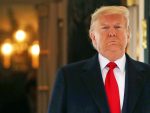Relief for Trump as Supreme Court Grants Him Partial Immunity
By Boniface Ihiasota, USA
In a landmark decision on Monday, the U.S. Supreme Court has ruled that former President Donald Trump and other former presidents have partial immunity from criminal prosecution for official acts, a significant legal victory for the Republican candidate in the upcoming presidential election.
Excel Magazine International reports that although the 6-3 ruling did not dismiss an indictment charging Trump with attempting to overturn the 2020 election but removed key elements of the case against him.
The justices determined that a president is immune for “official acts” but not for “unofficial acts,” referring the case back to a trial judge for further consideration.
The ruling makes it less likely that Trump will face trial before the November election, where he is challenging incumbent President Joe Biden.
The three liberal justices on the court strongly dissented. Justice Sonia Sotomayor warned of the ruling’s implications, writing, “The President is now a king above the law.” The decision marks the first time in U.S. history that the Supreme Court has declared former presidents can be shielded from criminal charges.
Trump celebrated the ruling on his social media platform, Truth Social, calling it a “Big win for our constitution and democracy.” In contrast, deputy Biden campaign manager Quentin Fulks expressed outrage, accusing the court of handing Trump “keys to a dictatorship.”
Special Counsel Jack Smith, who filed the indictment, declined to comment. The Supreme Court’s majority opinion, delivered by Chief Justice John Roberts, overturned a lower court’s rejection of Trump’s claim of absolute immunity. Roberts asserted that a president’s discussions with the Department of Justice and the vice president are official acts, granting Trump immunity in those instances.
The indictment accuses Trump of inciting the January 6 Capitol riot and pressuring state officials to alter electoral votes. However, the Supreme Court ruled that Trump’s actions on January 6 were official acts, and his private records and those of his advisors could not be admitted as evidence at trial.
The ruling raised concerns about the viability of the indictment once official acts are excluded. In her dissent, Justice Sotomayor argued that the decision could protect a president from severe abuses of power, while Justice Ketanji Brown Jackson warned that the ruling would undermine legal safeguards.
Legal experts noted the significant impact on the special counsel’s case. Constitutional law expert Aziz Huq emphasized the importance of narrowing the indictment, while legal analyst Mitchell Epner highlighted the trial judge’s role in determining which charges could proceed and the potential for further appeals.










